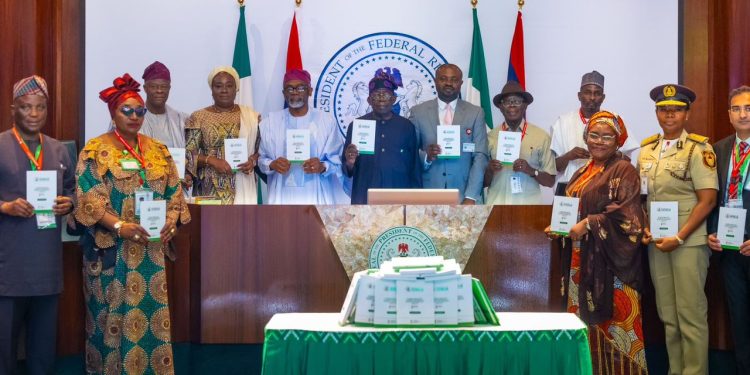Advocates Balancing Employment Opportunities between Nigerians and Expatriates
President Bola Tinubu, in a strategic move to foster home-grown skill retention and the domestication of technologies, launched the Expatriate Employment Levy (EEL) on Tuesday in Abuja. The initiative aims to narrow wage gaps between expatriates and the Nigerian labor force while creating more employment opportunities for qualified Nigerians in foreign companies operating within the country.
During the launch of the Expatriate Employment Levy handbook, President Tinubu emphasized the importance of achieving a balance in employment opportunities between Nigerians and expatriates. He stressed the need to make hiring Nigerians more attractive by closing the wage gap between expatriates and the Nigerian labor force.
President Tinubu, however, issued a stern warning, urging that the scheme should not be used as an impediment or a deterrent for foreign investors. While declaring his support for the Expatriate Employment Levy scheme, he encouraged the responsible authorities to avoid creating bottlenecks that could frustrate potential investors.
“We expect improved revenue generation; improved naturalization and indigenization; we anticipate the employment of more qualified Nigerians by foreign companies operating in this country. We seek a greater balancing of employment opportunities between Nigerians and expatriates and the closure of the wage gap between expatriates and the Nigerian labor force by making it more attractive to hire Nigerians,” President Tinubu stated.
Acknowledging the current economic challenges, President Tinubu assured Nigerians of imminent progress and development. He commended collaborative efforts among key institutions such as the Infrastructure Concession Regulatory Commission (ICRC), Federal Ministries of Finance, Budget and National Planning, and the Central Bank of Nigeria in steering the country towards economic growth.
The Minister of Interior, Mr. Bunmi Tunji-Ojo, provided insight into the initiative, explaining its operation as a public-private partnership model involving the federal government, the Nigeria Immigration Service (NIS), and a technical partner, EEL Projects Limited.
“The essence of this is to be sure that if you are bringing an expatriate to work in Nigeria, it should be a job that no Nigerian has the skill to do. That is the major objective of this particular initiative,” highlighted the Minister, emphasizing the focus on technology domestication.
President Tinubu concluded by officially launching the handbook of the Expatriate Employment Levy, expressing optimism about the positive impact the initiative will have on Nigeria’s economic landscape.















